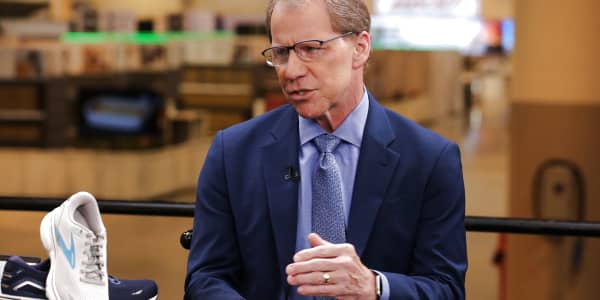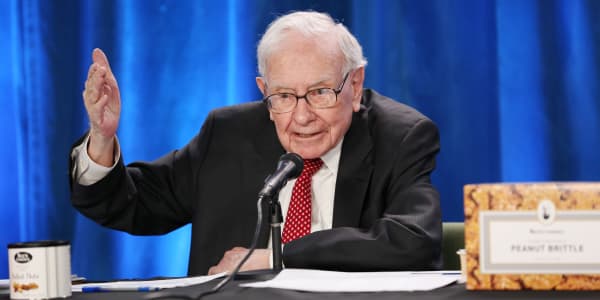Warren Buffett was interviewed live by telephone on CNBC's Squawk Box this morning about his surprise investment of at least $5 billion in Goldman Sachs.
A summary is available in the post Warren Buffett to CNBC: Government Bailout Plan Made $5B Goldman Investment Possible.
This is part two of the complete transcript of that conversation. (Click here for part one .. Click here for part three)
CARL QUINTANILLA: Separate from the bailout, Warren, people obviously this morning want to look at the Goldman deal, I guess on top of Mitsubishi-Morgan, which happened yesterday and wasn't nearly as popular, at least from a market point of view. But they want to point to you as the 'canary in the coal mine.' Is that fair? Do you have a problem with that?
WARREN BUFFETT: Well, as long as the canary lives, I'm fine. (Laughs.)
CARL: I'm guessing you're going to live. At least, you're guessing you're going to live?
BUFFETT: Yeah, I think so. (Laughs.) This is, you know, from our standpoint, we've had a lot of cash. And we now are seeing things that, you know, give us a chance to use that cash sensibly. And this was a five billion dollar opportunity to, I think, deploy cash sensibly. I understand, incidentally, that there will be another five billion. In other words, they mentioned 2-1/2 billion, but I think they're going to allocate it down to five billion additional. So Goldman will have ten billion, I believe, of new money coming in.
BECKY: In that capital offering. In the release, they said 2-1/2 billion (of common stock would be offered in addition to Buffett's investment.) You're saying you understand it's five billion?
BUFFETT: Yeah, I think they have quite an outpouring of orders, so I think -- They'll be allocating it down, but I think from all over the world. So I think there will be five billion of additional common stock sold. That will be determined and announced, I believe, before the opening.
JOE: How much do you know about AIG and their books right now, Warren?
BUFFETT: Well, I think I know a fair amount, but I don't think anybody knew what they needed to know, including the management. The troubles there were in the subsidiary, AIG Financial Products, and they had hundreds of thousands, I'm sure, hundreds and thousands of derivative contracts. And I think that top management did not have their mind around what was involved with those contracts. And you can do a lot of damage on Wall Street with a pen and a piece of paper.
JOE: How many of those units are going to end up under the Berkshire umbrella?
BUFFETT: Well, we would have an interest in a couple of 'em. And actually over that weekend I expressed an interest in one or two, but the pressures were such, and the hole was deep enough, that they simply couldn't get it worked out. And some of those units, most of those units, I believe, will be for sale over the next year or two. And we would be interested in a couple of them. I think they'll probably do a pretty intelligent job of selling them, which means we won't be as good a buyer.
CNBC.COM POLL: BUFFETT'S BET, A BOOST OF CONFIDENCE?
BECKY: You know, Warren, we've been trying to figure out -- I have to admit that I was shocked when I heard the news yesterday about this deal with Goldman, because you haven't put any money into an investment bank since 1987, Salomon. And that was a deal you had to get personally involved with later in 1991 when you went to run the company for almost a year. It was a very difficult experience. I'm shocked that you would get back in with another investment bank. Why do it?
BUFFETT: (Laughs.) Well, the pain has worn off. That won't be happening with Goldman, but I -- That was a very unfortunate experience, and it was actually caused by just a couple of people out of a workforce of 8000 that got the company into big trouble. And I had the help of a lot of people at Salomon in getting out of it. But I don't think this experience will be similar. Goldman has been extremely well run. My experience with Goldman goes back, when I was nine or ten years old my parents took me back to the New York World's Fair, and by an odd chance I got to sit down with Sidney Weinberg, who was the dean of Wall Street then, and he talked to me as if I was a grown-up for 45 minutes. I've never forgotten the experience. Gus Levy (who later ran Goldman in the 1970s) was a good friend of mine when I worked in Wall Street. In 1955, we only had four wires to Wall Street firms and one of them was to Goldman Sachs and Gus was on the other end of the phone. So I've had a long experience with Goldman and they've done a lot of things for me recently.
JOE: I just assume you know what was going on at all of these firms because I know everybody probably came to you and you made your decisions one-by-one on what to do. When you look at the way some of these assets were marked, could you tell that, for example, Lehman still wasn't facing reality and perhaps Merrill Lynch was more in the real world?
BUFFETT: Well, I think that turned out to be the case. I was approached on Lehman back in, I think, maybe it was April or March. But the first round of financing when they raised the four billion, and, yeah, it looked to me like it was pretty unrealistic where they were marking things. I feel good about the Goldman marks, incidentally, that's one of the discussions I've had. And -- You can be pretty fanciful in marking positions in Wall Street, particularly when things aren't trading. The one thing you want to make sure, when the Treasury is buying things, is the marks they have don't make any difference. Like I said, it wouldn't be a bad idea, if you're buying ten billion of a security and you're the Treasury, to have them sell five-hundred million, or something like that into the market, so you find out what the real market price is and then buy the other 9-1/2 billion at that price. I really think, I really think the Treasury will make -- I think they'll pay back the 700 billion and make a considerable amount of money, if they approach it in that manner. But I don't believe in trying to write that into some legislation. I think it gets so unworkable. I think you have a smart person in charge, and have them treat it like it's their own money, and the taxpayers' money, in terms of behavior, and I think it will work out very well. I think it's not comparable to the RTC.
SPRINGING THE NEWS ON CHARLIE
CARL: A lot of people who are watching us Warren, and even people who have just started watching us over the past week or two, look at the stock market every day and are confused. They want to use it as a metric for how we're doing, or at least the progress we're making on big issues. I'm guessing you don't think it's reflective of anything that's based in reality right now?
BUFFETT: Well, the stock market in the short -- my old boss Ben Graham said that in the short-run the stock market is a voting machine, in the long-run it's a weighing machine. As a voting machine, it responds to people's emotions. There's no literacy test for voting. You vote according to how much money you have, not according to how smart you (are.) So the stock market does some very silly things in the short-run. Over the long-run, it behaves quite rationally. And, you know, five years from now, ten years from now, we'll look back on this period and we'll see that you could have made some extraordinary buys. That doesn't mean it won't get more extraordinary a week or a month from now. I have no idea what the stock market is going to do next month or six months from now. I do know that the American economy, over a period of time, will do very well, and people who own a piece of it will do well. But they shouldn't own it on leverage. That's what people have learned in this period, that you've got to be able to play out your hand and it's a big mistake to let somebody else be in a position where they can sell you out.
BECKY: Warren, when you first invested back in '87 in Salomon, I believe your partner, Charile Munger, was not as enthusiastic about the idea as you were. Is that true?
BUFFETT: That's true. Of course, he's never as enthusiastic about my ideas as I am. But I would say he was even less enthusiastic. (Laughs.)
BECKY: How does he feel about the Goldman deal?
BUFFETT: Well, I'm glad you asked because I, (laughs), didn't tell him about it until after it was done. (Laughs.)
CARL: How rude!
BUFFETT: (Laughs.) Yeah, it is kind of rude. But Charlie's wife had a bad fall and he's (inaudible) and I called him last night about an hour after I committed it, or something, and I called kinda like a little boy ... (laughs) ... bringing into the house something he was a little worried about. But, Charlie's all for it. (Laughs.)
BECKY: He's all for it.
BUFFETT: Yeah. Now I'm really worried.
BECKY: Uh-oh. For the last nine months, Berkshire has spent a lot of that cash it's been hoarding over the last several years.
BUFFETT: That's right.
BECKY: I was trying to figure it out. I think it's about 24 billion dollars you've spent in the last nine months?
BUFFETT: Yeah, we've spent a lot of money. The money, the money we've spent, you know, we've found things we like to do. It's nice to have a lot of money, but you don't want to keep it around forever. I prefer buying things. Otherwise it's a little like saving up sex for your old age. (Laughs.) At some point, you've got to use it. (Laughter.)
JOE: Uh-oh.
BECKY: Twenty-four billion dollars. Is that a right guess and how much cash do you have left?
BUFFETT: You know, it would be 6-1/2 for the Mars deal, there's five for this, there's five for Constellation, there's a couple of other things. So, yeah, your addition is fine, Becky.
BECKY: How much cash do you have left?
BUFFETT: Well, I've got enough. (Laughs.) I don't really look at it every day. I look for opportunities every day, and then if I find opportunities, I see if I've got enough cash around to take care of them.
JOE: Well, by my calculation, if you lever that up thirty times, Warren, you can really get serious here. (Laughter.) Maybe you don't want to do that, I don't know. (Laughter.) What about, how are we going to deal with this looming 50 -- we just had (New York State Insurance Commissioner) Eric Dinallo on, I don't know if you were watching, Mr. Buffett. He talked about, he can, maybe New York and his unit can look at the twelve billion, or trillion, jeez, we've got to add a T. I'm finally getting used to Bs, now we have to add a T. But what we are going to do with that 50 trillion and how, having that still around, all these credit default swaps, how serious is that, and how are we going to unwind it and deal with it?
BUFFETT: Yeah, well, it goes beyond credit default swaps into all forms of derivatives. But the derivative genie got out of the bottle, and it's a huge genie, and it will never get back into the bottle. It is a terribly tough problem because they are not homogeneous items. It's one thing to have a clearing house for the futures in Chicago, or something, and every morning have everybody post to market and that's a very efficient system. It's very hard to do that with derivatives where you can derivatives based on the New Zealand money supply or the number of babies born in Japan, and all kinds of things as the variables. And they're often very complicated. I applaud Dinallo. He is an outstanding insurance commissioner. But getting regulation around the entire derivatives market is really tough. I've thought a lot about it. But it's important. Derivatives have been an important part of the problem in financial markets. And they continue to be part of it. And in AIG's case -- AIG would be doing fine now, I think, if they'd never heard of the word derivative.
PART THREE OF THE BUFFETT TRANSCRIPT: TIMED TO HELP THE PAULSON PLAN?
Current Berkshire stock prices:
Class A:
Class B:
Goldman Sachs:
Questions? Comments? Email me at buffettwatch@cnbc.com





